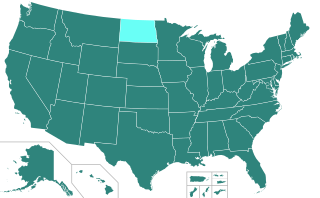
The Help America Vote Act of 2002, or HAVA, is a United States federal law which passed in the House 357-48 and 92–2 in the Senate and was signed into law by President George W. Bush on October 29, 2002. The bill was drafted in reaction to the controversy surrounding the 2000 U.S. presidential election, when almost two million ballots were disqualified because they registered multiple votes or no votes when run through vote-counting machines.

Voting rights, specifically enfranchisement and disenfranchisement of different groups, has been a moral and political issue throughout United States history.
Democrats Abroad is the official organization of the Democratic Party for United States citizens living temporarily or permanently abroad. The organization is given state-level recognition by the Democratic National Committee.

In the politics of the United States, elections are held for government officials at the federal, state, and local levels. At the federal level, the nation's head of state, the president, is elected indirectly by the people of each state, through an Electoral College. Today, these electors almost always vote with the popular vote of their state. All members of the federal legislature, the Congress, are directly elected by the people of each state. There are many elected offices at state level, each state having at least an elective governor and legislature. There are also elected offices at the local level, in counties, cities, towns, townships, boroughs, and villages; as well as for special districts and school districts which may transcend county and municipal boundaries.
In electoral systems, voter registration is the requirement that a person otherwise eligible to vote must register on an electoral roll, which is usually a prerequisite for being entitled or permitted to vote.
An absentee ballot is a vote cast by someone who is unable or unwilling to attend the official polling station to which the voter is normally allocated. Methods include voting at a different location, postal voting, proxy voting and online voting. Increasing the ease of access to absentee ballots is seen by many as one way to improve voter turnout through convenience voting, though some countries require that a valid reason, such as infirmity or travel, be given before a voter can participate in an absentee ballot. Early voting overlaps with absentee voting. Early voting includes votes cast before the official election day(s), by mail, online or in-person at voting centers which are open for the purpose. Some places call early in-person voting a form of "absentee" voting, since voters are absent from the polling place on election day.

Postal voting is voting in an election where ballot papers are distributed to electors by post, in contrast to electors voting in person at a polling station or electronically via an electronic voting system.
Secure Electronic Registration and Voting Experiment (SERVE) was an experiment by the Federal Voting Assistance Program (FVAP) to allow military personnel and overseas citizens covered by the Uniformed and Overseas Citizens Absentee Voting Act (UOCAVA) to vote in elections in the United States via the Internet. While called an experiment, SERVE included participation from 51 counties including up to 100,000 voters and ballots cast would have been counted toward actual election results. According to the SERVE security report, there were "two groups of eligible voters: (1) American citizens living outside the U.S., and (2) military personnel and their dependents, regardless of whether they reside in the U.S. or overseas."

Voter registration in the United States is required for voting in federal, state and local elections. The only exception is North Dakota, although cities in North Dakota may register voters for city elections. Voter registration takes place at the county level in many states and at the municipal level in several states. Most states set cutoff dates for voter registration and to update details, ranging from 2 to 4 weeks before an election; while a third of states have Election Day or "same-day" voter registration which enables eligible citizens to register or update their registration when they vote before or on election day.

The Uniformed and Overseas Citizens Absentee Voting Act (UOCAVA), P.L. 99-410, 52 U.S.C. §§ 20301–20311, 39 U.S.C. § 3406, 18 U.S.C. §§ 608–609, is a United States federal law dealing with elections and voting rights for United States citizens residing overseas. The act requires that all U.S. states, the District of Columbia, Puerto Rico, Guam, American Samoa, and the U.S. Virgin Islands allow certain U.S. citizens to register to vote and to vote by absentee ballot in federal elections. The act is Public Law 99-410 and was signed into law by President Ronald Reagan on August 28, 1986.
The Federal Voting Assistance Program (FVAP) is a voter assistance and education program established by the United States Department of Defense (DoD) in accordance with federal law to ensure that members of the U.S. armed forces, their eligible family members, and U.S. citizens overseas are aware of their right to vote and have the tools to do so from the country where they are residing.

The U.S. Vote Foundation is a non-partisan non-profit 501(c)(3) voter assistance and civic tech organization that helps United States citizens, domestically, overseas, or in the military, participate in elections by providing public access to internet-based voter services. The organization was originally founded as the Overseas Vote Foundation in 2005 by Susan Dzieduszycka-Suinat and other United States citizens living abroad as a way to assist overseas voters in exercising rights protected under the Uniformed and Overseas Citizens Absentee Voting Act (UOCAVA). In 2012, U.S. Vote was founded and expanded to include voting services for domestic voters. Overseas Vote remains an initiative of U.S. Vote.

Voter turnout in US elections is measured as a percentage, calculated by dividing the total number of votes cast by the voting age population (VAP), or more recently, the voting eligible population (VEP). Voter turnout has varied over time, between states, and between demographic groups. In the United States, turnout is higher for presidential elections than for midterm elections. US turnout is generally lower than that in other advanced democracies.

The Overseas Absentee Voting Act, officially designated as Republic Act No. 9189, is a Philippine law that provides an absentee voting system for Filipino citizens residing or working outside of the Philippines who are qualified voters. It was enacted on February 4, 2003, after an estimated 25% of the Filipino population working or living overseas at the time was found misrepresented on elections. It is a consolidation of Senate Bill No. 2104 and House Bill No. 3570, the first draft was authored in Congress on July 22, 2002. The act is implemented by the Commission on Elections (COMELEC) with the help of the Department of Foreign Affairs (DFA).
The Federal Write-In Absentee Ballot (FWAB) is a write-in ballot for use by overseas American citizens. Under the Uniformed and Overseas Citizens Absentee Voting Act, the ballot was created for citizens who "have made a timely application for but have not received their regular ballot from the state or territory, subject to certain conditions." Parts of the act are administered by the Federal Voting Assistance Program.
The Military and Overseas Voter Empowerment Act is Subtitle H of the National Defense Authorization Act for Fiscal Year 2010 and was an act of Congress signed into law by U.S. President Barack Obama on 28 October 2009. The law amended various provisions of the Uniformed and Overseas Citizens Absentee Voting Act (UOCAVA), which was passed in 1986 to centralize all previous federal laws concerning absentee voting for military and overseas voters.

Republicans Abroad was a global political organization for Americans living outside the United States until 2013.
Electoral fraud in the United States is considered by most experts to be a rare occurrence. A small number of elections in United States history have been invalidated due to electoral fraud, mostly at the local level.
As of 2020 a total of 141 countries grant expatriates the right to vote in elections in their countries of origin. There is considerable variation across countries in regard to voter eligibility, voting modalities, i.e. voting in person at diplomatic missions or other physical locations, by mail or online, which elections nonresident citizens may vote in, i.e. elections of the national legislature, executive elections, referendums, or sub-national elections, and how nonresident citizen voters are represented. The number of countries enfranchising nonresident citizens accelerated significantly in the 1990s. Social scientists have advanced a number of claims about the causes and consequences of this development and debated its normative implications or pros and cons of nonresident citizen voting.

Postal voting in the United States, also referred to as mail-in voting or vote by mail, is a form of absentee ballot in the United States, in which a ballot is mailed to the home of a registered voter, who fills it out and returns it by postal mail or drops it off in-person at a secure drop box or voting center. Postal voting reduces staff requirements at polling centers during an election. All-mail elections can save money, while a mix of voting options can cost more. In some states, ballots may be sent by the Postal Service without prepayment of postage.










